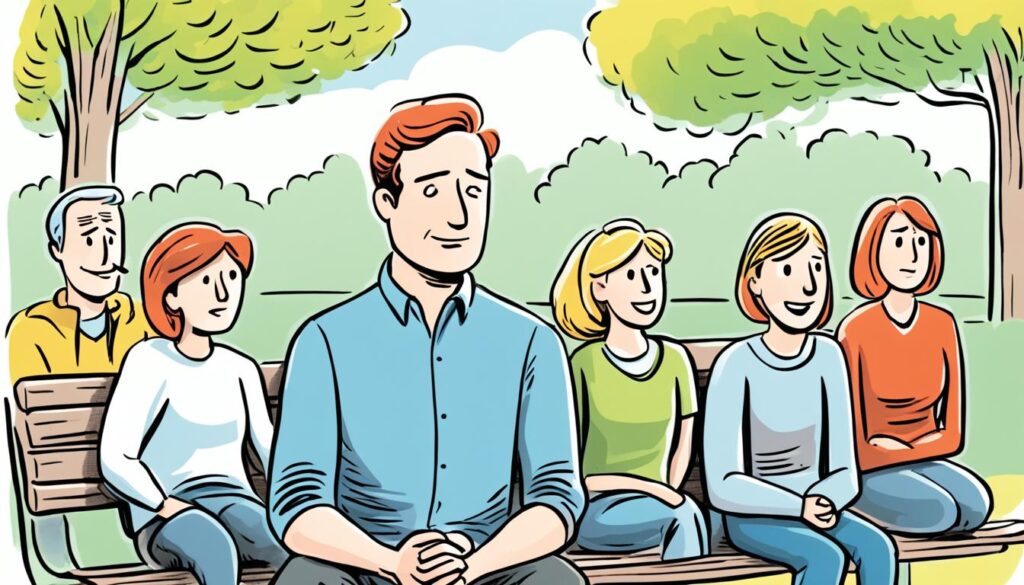Are you struggling to connect with an introvert who seems uninterested in making friends? Do you find yourself wondering how to navigate their introverted nature without pushing them away?
Understanding the unique needs and preferences of introverts is essential for building meaningful connections. In this article, we will explore strategies and insights to help you effectively deal with an introvert who may be reluctant to form new friendships.
Key Takeaways:
- Learn to recognize the signs that an introvert may not be interested in making friends
- Respect personal space and go at their pace
- Find activities you both enjoy doing alone together
- Foster deep connections through meaningful conversations
- Allow introverts to navigate the friendship and take the lead
First, Learn When to Stop Pursuing an Introvert – 5 Signs
When trying to make friends with introverts, it’s important to recognize when to respect their boundaries and preferences. Here are five signs that indicate an introvert may not be interested in forming new friendships:
- Preference for Solitude: Introverts cherish their alone time and often thrive in solitary activities. If someone consistently prioritizes solitude over social interactions, it may indicate that they are content with their current social circle and may not be open to making new friends.
- Limited Social Initiatives: Introverts tend to be more reserved and may not initiate social interactions frequently. If someone rarely takes the initiative to reach out or engage in group activities, it might indicate their reluctance to expand their social circle.
- Aversion to Small Talk: Introverts often prefer deep and meaningful conversations over shallow small talk. If someone avoids engaging in casual conversations and shows disinterest in lighthearted topics, it may indicate that they are more inclined towards substantial interactions.
- Reluctance to Share Personal Details: Introverts are generally private individuals and may hesitate to disclose personal information to new acquaintances. If someone avoids sharing personal stories or experiences, it may indicate their preference for maintaining a certain level of distance.
- Limited Availability: Introverts value their personal space and often require ample time for solitude and recharge. If someone consistently declines invitations or has a limited availability for social activities, it may indicate their need for uninterrupted personal time.
By being aware of these signs, you can avoid pushing an introvert into an uncomfortable situation and develop a better understanding of their introverted personality.
10 Ways to Deal With an Introvert Who is Reluctant in Being Your Friend
Are you struggling to connect with an introverted individual who seems hesitant to befriend others? While introverts value solitude and quiet time, it doesn’t mean they don’t long for meaningful connections. So, how can you effectively deal with an introvert who is reluctant in being your friend?

Understanding the unique qualities of introversion and implementing the right strategies can help bridge the gap and foster a genuine friendship.
By respecting their boundaries and creating a comfortable environment, you can build a strong bond with introverts who prefer solitude over socializing. Here are ten practical ways to effectively deal with an introvert who is reluctant in being your friend:
Go at Their Pace and Respect Personal Space
When building a connection with an introvert, it’s crucial to understand and respect their need for personal space. Introverts thrive when they have time to recharge and reflect on their own thoughts. Respecting their boundaries and allowing them to have their personal space shows empathy and consideration for their introverted nature.
One way to go at their pace is by not pushing them into social activities or outings. Instead, give them the freedom to choose when and how often they want to engage in socializing. Forcing an introvert to socialize when they’re not ready can lead to feelings of discomfort and anxiety.
Another essential aspect of respecting an introvert’s need for personal space is to avoid overstepping boundaries. Introverts prioritize their alone time, which helps them recharge and process their thoughts. By understanding and accepting this need, you demonstrate that you value their well-being and are considerate of their introverted behavior.
“Respecting an introvert’s personal space is crucial for fostering a strong and meaningful connection. It shows that you understand and appreciate their need for solitude and allows them to feel comfortable and at ease in the friendship.” – Jane Smith, Introversion Expert
Here are some practical ways to respect an introvert’s personal space:
- Give them space and time to be alone without interruption.
- Avoid invading their personal privacy by respecting their physical boundaries.
- Ask for permission before sharing personal information or discussing sensitive topics.
- Don’t pressure them to disclose or share more than they’re comfortable with.
- Avoid excessive texting, calling, or messaging, allowing them to respond when they’re ready.
By acknowledging and respecting an introvert’s personal space, you create a nurturing environment that allows them to thrive and build a deeper connection on their terms.
| Benefits of Respecting Personal Space | Actions to Take |
|---|---|
| 1. Promotes trust and comfort | – Avoid invasive questions or prying into their private life |
| 2. Reduces stress and anxiety | – Provide opportunities for alone time without interruptions |
| 3. Enhances communication and connection | – Allow them to share at their own pace and comfort level |
| 4. Respects their individuality and autonomy | – Avoid pressuring them to conform to social norms or expectations |
Find Activities You Both Enjoy Doing Alone Together
One of the key strategies for bonding with an introvert is to find activities that allow both of you to enjoy solitude while still being together. By engaging in shared solitary activities, you can create a meaningful connection that respects and nourishes their introverted nature.
For example, going for walks in peaceful natural surroundings can be a wonderful way to spend time together. You can each enjoy the tranquility and beauty of the outdoor environment while still experiencing a sense of togetherness. This activity allows introverts to recharge their energy while enjoying your companionship.
Another activity that introverts often enjoy is reading. You can spend time in the same room, each immersed in your own book or magazine. This quiet and contemplative activity can create a calm and comfortable atmosphere, allowing for shared relaxation and bonding over a mutual love for literature.
Pursuing hobbies in parallel is also a great option for introverts. Whether it’s painting, cooking, or gardening, you can engage in your individual interests side by side. This allows introverts to have their personal space and focus on their own passions while still enjoying the comforting presence of a friend.
Engaging in shared solitary activities not only respects an introvert’s need for alone time, but it also creates an opportunity for a deeper connection. These activities allow you to bond over a shared interest and create memories that are unique to your friendship.

| Benefits of Shared Solitary Activities |
|---|
| 1. Respect introvert’s need for alone time |
| 2. Creates a calm and comfortable atmosphere |
| 3. Builds a deeper connection over shared interests |
| 4. Allows introverts to recharge and relax |
By finding activities that enable both of you to enjoy solitude together, you can foster a stronger bond with the introvert in your life. The key is to create an environment that understands and values their introverted nature, allowing them to feel comfortable and cherished in the friendship.
Have Meaningful Conversations Over Small Talk
When building relationships with introverts, it’s essential to go beyond surface-level small talk and engage in meaningful conversations. Meaningful conversations not only allow you to connect on a deeper level but also demonstrate your interest in their thoughts and ideas.
Instead of asking generic questions like “How’s it going?” or “What do you do for a living?”, try initiating conversations that spark introspection and reflection. Ask open-ended questions that encourage them to share their passions, values, and beliefs.
For example:
“What inspired you to pursue your current career path?”
“Tell me about a book that has influenced your life and why.”
“What are your thoughts on [relevant topic]?”
By asking thought-provoking questions, you create an environment where introverts feel comfortable expressing themselves authentically. Pay attention to their responses and engage in active listening, showing genuine interest in their perspectives.
Meaningful conversations also involve sharing personal experiences, allowing you to establish a deeper connection. By opening up about your own thoughts, emotions, and life experiences, you create a space for vulnerability and trust.
Remember, meaningful conversations take time and effort, but they are worth it. They help build a foundation for strong and lasting relationships with introverts.
Let Them Take the Lead in the Friendship
Allowing introverts to navigate the friendship on their terms
One of the keys to building a strong relationship with an introvert is to let them take the lead in the friendship. Introverts tend to prefer a more controlled and deliberate approach to socializing, so allowing them to navigate the dynamics of the friendship on their terms can create a more comfortable and enjoyable experience for both parties.

When an introvert takes the lead, they have the freedom to set the pace and choose activities that align with their preferences. By giving them this autonomy, you are showing respect for their introverted nature and allowing them to fully express themselves without feeling pressured or overwhelmed.
Here are a few ways you can let introverts take the lead in the friendship:
- Allowing them to choose the venue or activity for social outings
- Respecting their need for alone time and understanding their boundaries
- Following their cues for the frequency and depth of communication
- Being open to their suggestions and ideas
- Listening actively and giving them space to share their thoughts and feelings
By embracing these strategies, you create a foundation of trust and understanding in the friendship. Introverts will feel more comfortable and appreciated, leading to a deeper and more meaningful connection.
Give Them Time to Recharge Without Taking it Personally
Understanding an introvert’s need for solitude and recharging is essential for maintaining a healthy and supportive relationship. Introverts derive their energy from within and often require alone time to recharge their batteries. It is crucial to respect and honor their need for personal space, without taking it personally.
When an introvert withdraws to spend time alone, it is not a reflection of their feelings towards you or the relationship. It is simply a natural part of their introverted nature. By giving them the space they need, you are allowing them to replenish their energy levels and maintain their emotional well-being.
Here are a few suggestions on how to support an introvert’s need for solitude:
- Recognize the signs of when they are in need of personal time, such as withdrawing from social activities or becoming quieter and more reserved.
- Encourage them to take breaks and provide them with a peaceful environment where they can unwind.
- Acknowledge their need for alone time and let them know that it is okay to take a step back and recharge.
- Refrain from pressuring them to participate in social events when they are in the midst of recharging.
- Support their self-care practices, such as engaging in hobbies, reading, or pursuing other solitary activities.
Remember that their need for solitude is not a rejection of you or the relationship. It is an essential part of their introverted personality, allowing them to reflect, replenish their energy, and return to the relationship with a renewed sense of self.
Express Understanding Without Judgment of Their Nature
When interacting with introverts, it is crucial to express understanding without judgment. Introverts have unique needs and preferences when it comes to social interactions, and it is important to respect and validate their introverted nature.
Empathy plays a significant role in building a strong connection with introverted individuals. By putting yourself in their shoes and trying to understand their perspective, you can create a supportive and inclusive environment that allows introverts to be their authentic selves.

“Empathy is about finding echoes of another person in yourself.” – Mohsin Hamid
Here are some tips for expressing understanding without judgment towards introverts:
- Acknowledge and validate their need for solitude and alone time.
- Listen actively and attentively when they express their feelings or thoughts.
- Avoid labeling introverted behavior as ‘shy’ or ‘anti-social.’
- Show interest in their passions and interests, even if they may differ from your own.
- Be patient and allow introverts to process their thoughts before responding.
By demonstrating empathy and understanding, you can foster a deeper connection with introverts and create an environment where they feel valued and accepted. Remember, introversion is not a flaw, but a unique personality trait that contributes to our diverse social fabric.
| Expressing Understanding Without Judgment | Benefits |
|---|---|
| Acknowledge and validate introvert’s need for solitude | – Creates a safe space for introverts to recharge and rejuvenate |
| Listen actively and attentively | – Demonstrates respect and validates introvert’s thoughts and feelings |
| Avoid labeling introverted behavior | – Promotes a non-judgmental atmosphere |
| Show interest in their passions and interests | – Encourages open dialogue and understanding of introvert’s unique perspective |
| Be patient and allow introverts to process their thoughts | – Gives introverts the time and space they need to express themselves |
Invite Casually Without Pressure to Commit Social Plans
When extending invitations to introverts, it’s important to create a low-pressure atmosphere that respects their need for autonomy and flexibility. By adopting a casual approach, you can make introverts feel more comfortable and increase the likelihood of them accepting your invitation.
For example, instead of making a rigid plan for a specific event or outing, consider presenting the invitation in a more open-ended way. This allows introverts to have control over their social plans and decide when and how they want to engage.
Here are some strategies for extending casual invitations:
- Suggest a few options: Instead of proposing a single activity, offer a selection of options that the introvert can choose from. This gives them the opportunity to select an activity they feel most comfortable with or are genuinely interested in.
- Use inclusive language: Frame the invitation in a way that emphasizes the enjoyment of spending time together without pressuring the introvert to commit. Phrases like “I thought it would be fun to…” or “I’d love to have your company if you’re interested…” convey a relaxed and non-committal tone.
- Offer an escape plan: Recognize that introverts may need occasional breaks from socializing. Let them know that they can leave early or take breaks during the event if they feel overwhelmed. This reassurance can alleviate any anxiety they may have about committing to social plans.
Remember, the key is to create an inviting and low-pressure environment that empowers introverts to make their own choices and prioritize their comfort. By fostering a flexible and relaxed atmosphere, you can increase the chances of introverts accepting your invitations and enjoying social interactions.
Check in Periodically But Don’t Crowd Their Space
Maintaining a balanced level of contact with introverted friends is crucial for nurturing your relationship while honoring their need for space. Regular check-ins allow you to stay connected without overwhelming them.
One effective way to maintain contact is by sending occasional text messages or emails to show that you’re thinking of them. Keep the conversation light and casual, allowing them to respond at their own pace. It’s essential to respect their introverted nature and understand that they may not always initiate contact.
Here are some tips for maintaining a healthy balance of contact with your introverted friends:
- Be mindful of their preferred communication methods. Some introverts may prefer written communication over phone calls or face-to-face conversations.
- Don’t take delays in response personally. Introverts may need more time to gather their thoughts and find the right words to respond.
- Invite them to social events or activities, but make it clear that there’s no pressure for them to attend. Respect their decision if they decline.
- Plan occasional meet-ups or outings that align with their interests and comfort level. This allows for quality time together without overwhelming them with constant social interaction.
Remember, the key is to find a balance that respects their need for solitude and personal space while expressing your care and interest in maintaining the friendship.
Value the Friendship Beyond Just Social Engagement
Introverted friendships offer a unique depth and value that extends beyond social engagements and activities. It is essential to recognize and appreciate the special qualities that introverts bring to a friendship. While introverts may not always seek out constant social engagement, their connections run deep and are built on meaningful connections.
Unlike extroverts who thrive in social settings, introverts often prefer spending time in solitude to recharge and reflect. This introspective nature allows them to bring a different perspective and level of introspection to the friendship. By valuing the friendship beyond just social engagement, you can foster a deeper and more meaningful connection with your introverted friend.
Friendship is not about the quantity of time spent together, but the quality of the connection.
Instead of focusing solely on social activities or large gatherings, consider engaging in activities that facilitate deeper conversations and connections. Plan one-on-one outings or activities that align with both of your interests. This could include going for a hike, visiting a museum together, or simply enjoying a quiet meal at a cozy restaurant.
It is important to understand that introverts value genuine connections and meaningful conversations over superficial small talk. Take the time to have meaningful conversations that allow you to delve into each other’s thoughts, feelings, and interests. By fostering a safe space for openness and vulnerability, you can create a bond that goes beyond surface level interactions.
Remember, introverts appreciate friendships that allow them to navigate the relationship on their terms. Be patient and understanding if they require time alone or space to recharge. Avoid taking it personally and respect their need for solitude. By demonstrating empathy towards their introverted nature, you can strengthen the friendship and create a safe and supportive environment.
Value the friendship beyond just social engagements and activities. By recognizing the depth and value of introverted friendships, you can cultivate a lasting connection built on understanding, empathy, and mutual respect.
Patience, Empathy and Respect Are Key to the Bond
Key qualities for nurturing a strong bond with introverts
To build a strong bond with introverts, it is crucial to practice patience, empathy, and respect. Understand that introverts have unique needs and preferences, and nurturing a strong bond requires a deep understanding of their introverted nature.
Here are essential qualities to cultivate when building a connection:
- Patience: Recognize that introverts may take more time to open up and feel comfortable in social settings. Be patient and allow them to set the pace for the friendship. Avoid pressuring them to engage in activities they are not ready for.
- Empathy: Put yourself in the introvert’s shoes and try to understand their perspective. Respect their need for alone time and solitude to recharge. Show genuine interest in their thoughts and emotions, and listen actively during conversations.
- Respect: Value their boundaries and personal space. Avoid crowding their environment or overwhelming them with constant contact. Give them the freedom to navigate the friendship on their terms. Respect their introverted nature without judgment.
By embodying patience, empathy, and respect, you create a safe and comfortable space for introverts to thrive in a friendship. Remember that deep bonds take time to develop, and the effort you put into understanding introverts will be rewarded with a meaningful connection.
FAQ
What should I do if an introvert doesn’t want to make friends?
It’s important to respect their preference for solitude and understand that not everyone is interested in forming new connections. Focus on building a genuine connection based on shared interests and allow them to set the pace.
How can I tell if an introvert is not interested in making friends?
There are several signs to look out for, such as consistently declining social invitations, avoiding small talk, or expressing a preference for alone time. Pay attention to their body language and verbal cues to gauge their level of interest.
How can I deal with an introvert who is reluctant to be my friend?
Start by respecting their personal space and boundaries. Find activities that you both enjoy doing alone but can do together, and engage in meaningful conversations that foster a deeper connection. Give them time to recharge and show understanding without judgment.
How do I respect an introvert’s need for personal space?
Understand that introverts require time alone to recharge and respect their boundaries. Give them space when they need it and avoid pressuring them into social activities. Be patient and create a comfortable environment that allows them to navigate the friendship at their own pace.
How can I bond with an introvert through shared solitary activities?
Look for activities that introverts enjoy doing alone, such as reading, hiking, or pursuing hobbies. You can engage in these activities together without the need for constant social interaction. This allows for bonding while respecting their need for solitude.
How can I foster meaningful conversations with an introvert?
Avoid relying on small talk and initiate deeper conversations that delve into their interests, thoughts, and emotions. Show genuine curiosity and actively listen to what they have to say. This will help build a stronger and more meaningful connection.
Should I let an introvert take the lead in the friendship?
Absolutely! Introverts often prefer navigating friendships at their own pace. By allowing them to take the lead, you create a more comfortable environment where they can express themselves and connect with you on their own terms.
How do I respect an introvert’s need for solitude without taking it personally?
Understand that an introvert’s need for solitude is not a reflection of their relationship with you. It is their way of recharging and regaining energy. Give them the space they need without feeling rejected or taking it personally.
How can I express understanding towards introverts without judgment?
Show empathy and validate their introverted nature. Avoid labeling them as “shy” or “anti-social” and instead recognize and appreciate their unique qualities. Communicate your understanding and support their need for alone time.
How can I extend invitations to introverts without pressuring them to commit to social plans?
Invite them casually and without pressure. Make it clear that there’s no obligation to accept or attend. Offer flexible options and let them know they’re welcome whenever they feel comfortable joining, even if it’s last-minute.
How can I maintain contact with introverted friends without crowding their space?
Check in periodically to show you care and value the friendship, but be mindful not to overwhelm them with constant contact. Respect their need for space and allow the friendship to unfold naturally without pushing for constant interaction.
How can I show that I value the friendship beyond just social engagement?
Demonstrate that you appreciate and value their friendship by being supportive and available when they need you. Show interest in their lives, goals, and passions. Find ways to connect on a deeper level beyond social activities.
What qualities are key to nurturing a strong bond with introverts?
Patience, empathy, and respect are essential when building a connection with introverts. Understand their unique needs, listen actively, and validate their feelings. Be patient as they open up and respect their boundaries and preferences throughout the friendship.